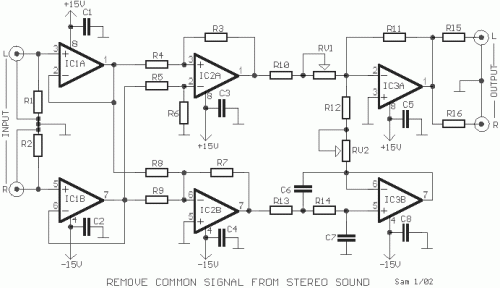- Three Channel Audio Splitter Circuit Diagram & Build Guide
- Build a 500Hz-2Khz Notch Filter with 0.1uF & 1.5K Resistors
- Build Your 1700Hz Op-Amp Bandpass Filter Circuit
- Build Stunning 2nd Order Opamp Filters – Design Guide
- Craft a 300-3kHz Bandpass Filter Circuit Diagram
- Separate Stereo Bass: A Circuit for Clarity
- Variable High-Pass Filter: 20Hz to 200Hz Design
Separate Stereo Bass: A Circuit for Clarity
Description
Frequently, it is desired to eliminate or attenuate specific audio elements within a musical composition, such as the vocals or other prominent sounds, typically present at similar levels across both channels. Removing the differential between these two signal channels yields a mono output devoid of the unwanted sound. A similar challenge arises with bass instruments, which are often represented in this dual-channel format. This circuit design addresses this issue by combining the low-frequency signal with the phase difference signal through IC3Α. The balance is precisely controlled using potentiometers RV1 and RV2. To prevent phase drift introduced by capacitors along the signal path, careful attention must be paid to the selection of materials. Resistors must be manufactured to a precision of 1% utilizing metal film technology. This configuration, sourced from Elektor 8/89, offers a reliable solution for managing bass frequencies and phase imbalances.
Integrated Circuit Details
The core of this circuit relies on the TL072 operational amplifier. This dual-input, dual-output operational amplifier is a very common choice for audio applications due to its low noise, high input impedance, and low output impedance. The TL072 provides excellent signal amplification and buffering capabilities, making it suitable for precise control of the audio signal. Its balanced output ensures a clean and stable audio output.
Circuit Diagram
Part List
- R1-2=100Kohm
- R3-4-5-6-10=10Kohm
- R7-8-9=6.8Kohm
- R11=27Kohm
- R12=47Kohm
- R13-14=5.6Kohm
- R15-16=100ohm
- C1-2-3-4-5-8=100nF ceramic
- C6=180nF 100V MKT
- C7=120nF 100V MKT
- IC1-2-3=TL072
- RV1=100Kohm Log.
- RV2=250Kohm Log.
All the Resistors is 1/4W 1% metal film
Attention should be given to the quality of materials. The ceramic capacitors should be 100nF. The capacitors C6 and C7 are MKT type, 100V 180nF and 120nF, respectively.
Warning: This circuit contains electronic components that can cause electrical shock or fire if not handled properly. Exercise caution and consult with a qualified professional if you are not familiar with electronic circuit design and construction.
Source: Elektor 8/89
